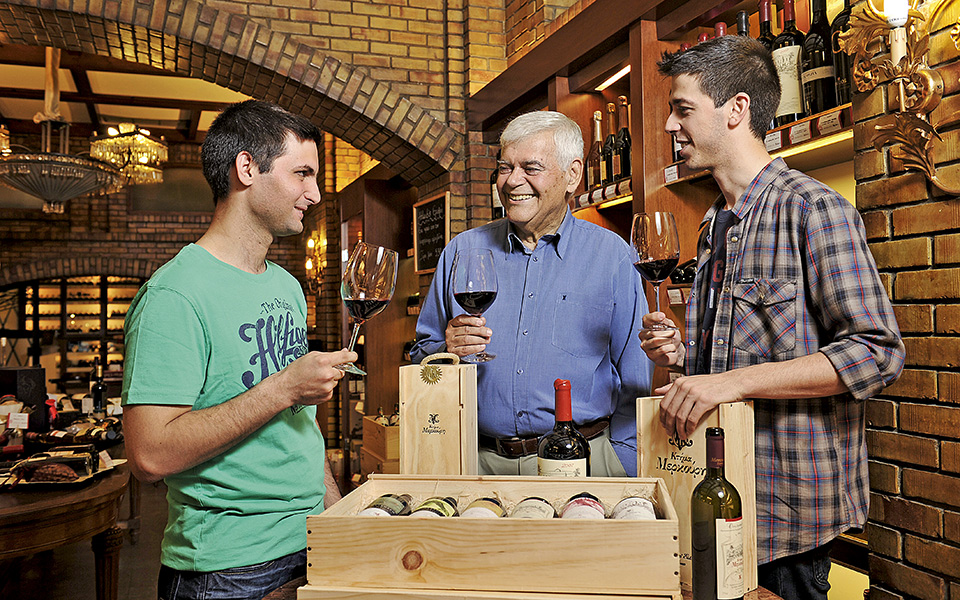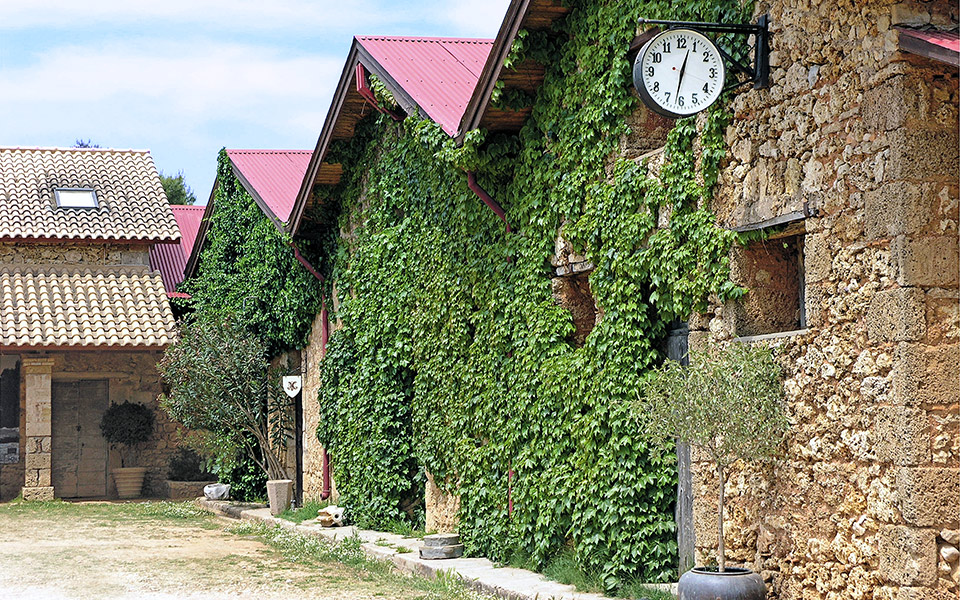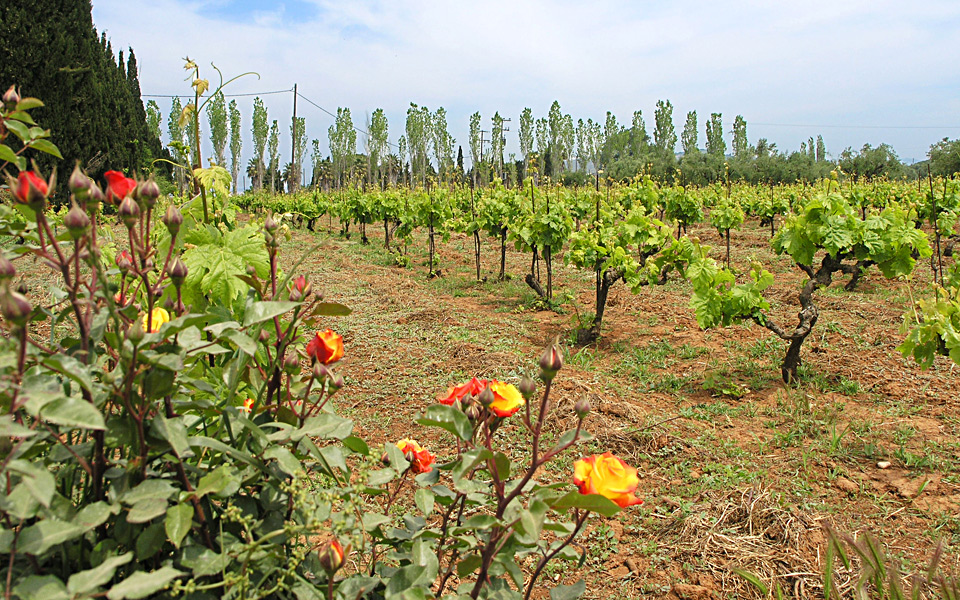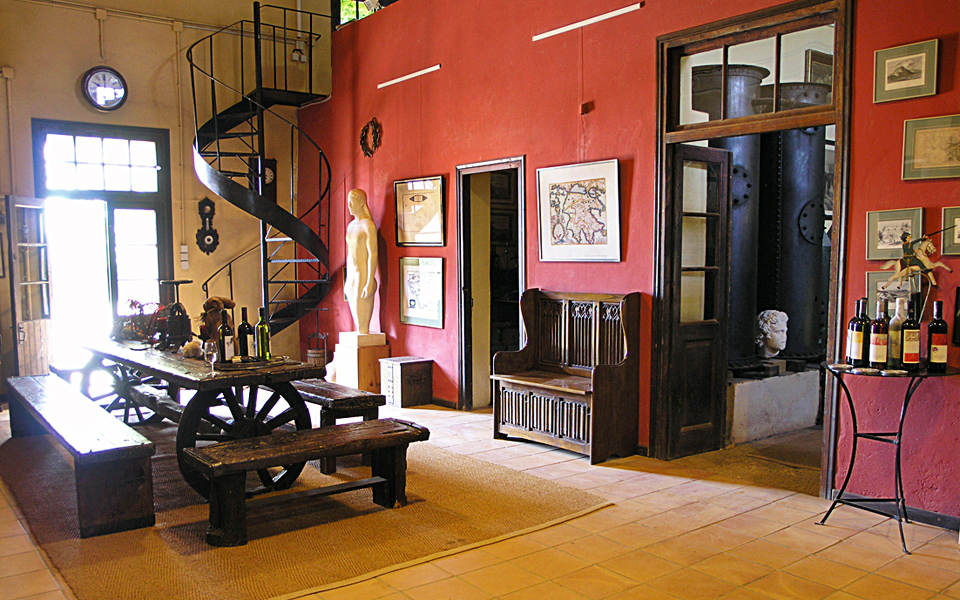Leloudas: Athens’ Legendary Wine Taverna
Since 1928, this family-run wine taverna...

Vasilis Kanellakopoulos with his two sons, the fifth generation of the Mercouris family.
© Vaggelis Zavos
For one and a half centuries, the same family on the same piece of land has been growing the same variety of grapes and producing attention-grabbing wines. From Theodoros Mercouris to the Kanellakopoulos brothers, this is their fascinating history.
It all started in the mid-19th century when Theodoros Mercouris, a young man from a small mountain village in the northwestern Peloponnese called Dirvi, now known as Lampia, had a problem. His actions and public condemnations of the Greek king Otto had rendered him an outcast. Enjoying no support, he bid farewell to his family and boarded a boat that initially took him to Zakynthos – then under British rule – and from there to Italy. For a few years he worked in large wine estates and became acquainted with the Refosco variety, an impressively large red grape producing a very dark wine, which enjoyed much popularity at the time. Restless in spirit, adventurous in nature and with many aspirations and dreams for a better future, Mercouri decided to uproot himself again, this time for Egypt. The ship sank on the way, but he survived and arrived safely in Alexandria.
There, fortune began to smile on him. He became active in the cotton trade and, since he was already a capable entrepreneur, he saved money and became a prominent member of the port city’s Greek community. Moreover, he got to know and fell in love with Maria Paleologou, whose roots were in Chios. They married and had four children: Leonidas (we’ll come back to him later in our story); Konstantinos, who grew up and left for Australia; Pericles, who became a merchant in Thessaloniki; and Alexandros, who died very young from a sudden illness.
Despite his success, Mercouris was not complacent. In addition, he had a nagging nostalgia for his homeland. So, with his family, he returned to the Peloponnese, where in 1864 he bought 60 hectates in Karakochori, in Ilia prefecture, near Katakolo and Olympia. A difficult, rocky terrain, the area was susceptible to landslides. Through toil and sweat, the family made the land arable, creating Domaine Mercouri, which for decades was focused on the production of currants, then the black gold of the Peloponnese and Ionian islands. A wine lover and yearning for his time in Italy, in 1870 he ordered Refosco cuttings to plant on his property. The result was the first, single-variety vineyard in the history of Greek winemaking in Greece. Preserving that precious link with the past, a half hectare of the original vineyard survives.

Downy mildew and bankruptcy
In 1880 the construction of the family home, designed by Italian architects and built to Tuscan standards, was completed. Production was booming, everything was going well and the wine from the estate was selling like hot cakes on the markets of Trieste. No one could have foreseen the impending storm. In 1893, phylloxera arrived in Greece via France, destroying the crop two years in row. The company went bankrupt and passed into the hands of the National Bank.
Forced to rent their own estate, the family waged a 30-year legal battle to secure its return, a moment that Mercouris did not live to see. The blow of bankruptcy was so great that in 1897 he suffered a stroke and died, bequeathing his fortune to his eldest child, Leonidas.
Considering wine to be a good investment, Leonidas built a winery. It was modern for its time, with underground concrete tanks and machinery from France, and with an infrastructure that remains impressive even to this day. “Of course, the bankrupcy taught Theodoros’ heirs a major lesson, that monoculture is a high risk,” says Vasilis Kanellakopoulos, from the family’s fourth generation. “So, they first planted olives as an alternative. By the 1950s, they were producing currants and grapes in addition to olives. Gradually, they focused on olives – and other trees, such as peach, which were not particularly productive. So this was the estate when it came into the hands of our, the fourth, generation. We cultivated the vineyards and sold the grapes to Karela, the Patras Cooperatives Union and Achaia Clauss. Then in the 1980s, we were bitten by the winemaking bug.”

Fourth and fifth generation
Indeed, in was in 1985 that Vasilis and his brother Christos, who are the sons of Maria, one of Leonidas Mercouris’ four children, decided that they had to keep the estate at all costs. They considered it an obligation to their mother and her siblings, Eleni, Theodoros and Kaiti, who had kept it alive in times of great difficulty, such as the immediate post-war years. They also had a great love of the land, which might be genetic since their father was an agronomist.
“An inheritance is both a good and bad thing. It’s a double-edged sword,” says Vasilis. “You have an important asset, but also a commitment which might prevent you from doing what you really want. But for us, the property was a part of our lives. And we couldn’t say that in the name of modern technology we would knock down the old winery. We maintained it to some degree, we modernized whatever else we could, and that’s how we continue.”
The entire vineyard now covers 16 hectares, a quarter of which is given over to Refosco. There is, of course, the old type, the one brought from northern Italy by the family patriarch, but also a new one from Friuli, the Refosco with the red peduncle or stalk, as the Italians call it. “The traditional Refosco is a mature variety but this is not always consistent with quality,” Vasilis explains. “The new one is in the early stages and has a smaller yield, so we focused on that. Since 1960 we also have grown Mavrodafni in our vineyard – we were the first to use it as an improving variety in our red wines rather than in its classic form of a sweet wine.”
Later, Avgoustiatis and Agiorgitiko were added (“in particular to see what it can give to our terroir”). “Up to that point we were called the ‘red estate’ and ‘bastion of red varieties’. So we decided to try some white. It was a challenge. We made Foloi from the Roditis grape. We planted Assyrtiko and Robola. Although Chardonnay and Cabernet Sauvignon were very fashionable at that time, we decided to go against the trend. So we chose Mourvedre and Negroamaro. We also have Viognier, which forms 10 percent of our Foloi label to give it a better structure and higher aromaticity. Overall we work with 15 varieties and produce 13 labels.”

Is Refosco a Greek variety? “Of course!” says the great grandson of Theodoros Mercouris, with a laugh. “It’s been in our country nearly 150 years. If it were an immigrant, it would have received Greek citizenship by now.”
Since Domaine Mercouri entered a new era, its wines have excelled in national and international competitions and won the approval of consumers at home and abroad. “We didn’t start with a lot of capital to invest. We kept our jobs on the side – my brother is an agronomist and civil engineer – and slowly we got to a point where we are autonomous. Then the Greek crisis hit,” he says.
And the fifth generation? Is it ready to step in? “Yes!” Vasilis has two sons: Dimitris, who studied oenology, and Haralambos, a civil engineer. Now, 155 years since Theodoros Mercouris set foot on this piece of land and fell instantly in love with it, his descendants are following in his footsteps. “The challenge is to grow stronger from the crisis and take advantage of what we have achieved in recent decades. There are people who have entered the field of Greek wine who are not connected by either love or tradition with wine. Perhaps through this juncture, we’ll find some balance again. I hope we clear this obstacle and remain standing firm.”
Since 1928, this family-run wine taverna...
Why not try a brief getaway...
Discover Greece’s winemaking heritage with tastings,...
Explore Corfu’s once-forgotten vineyards and discover...